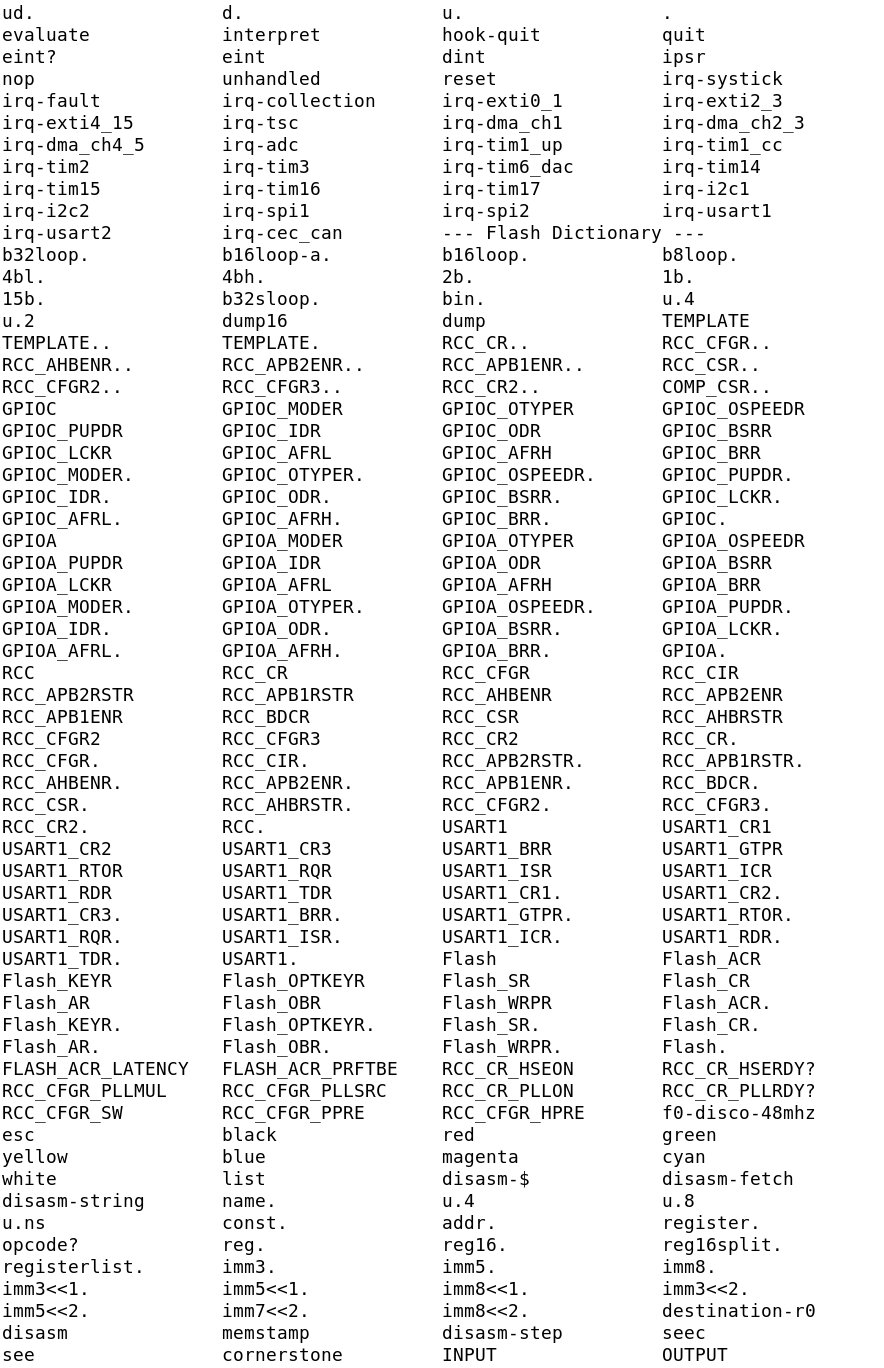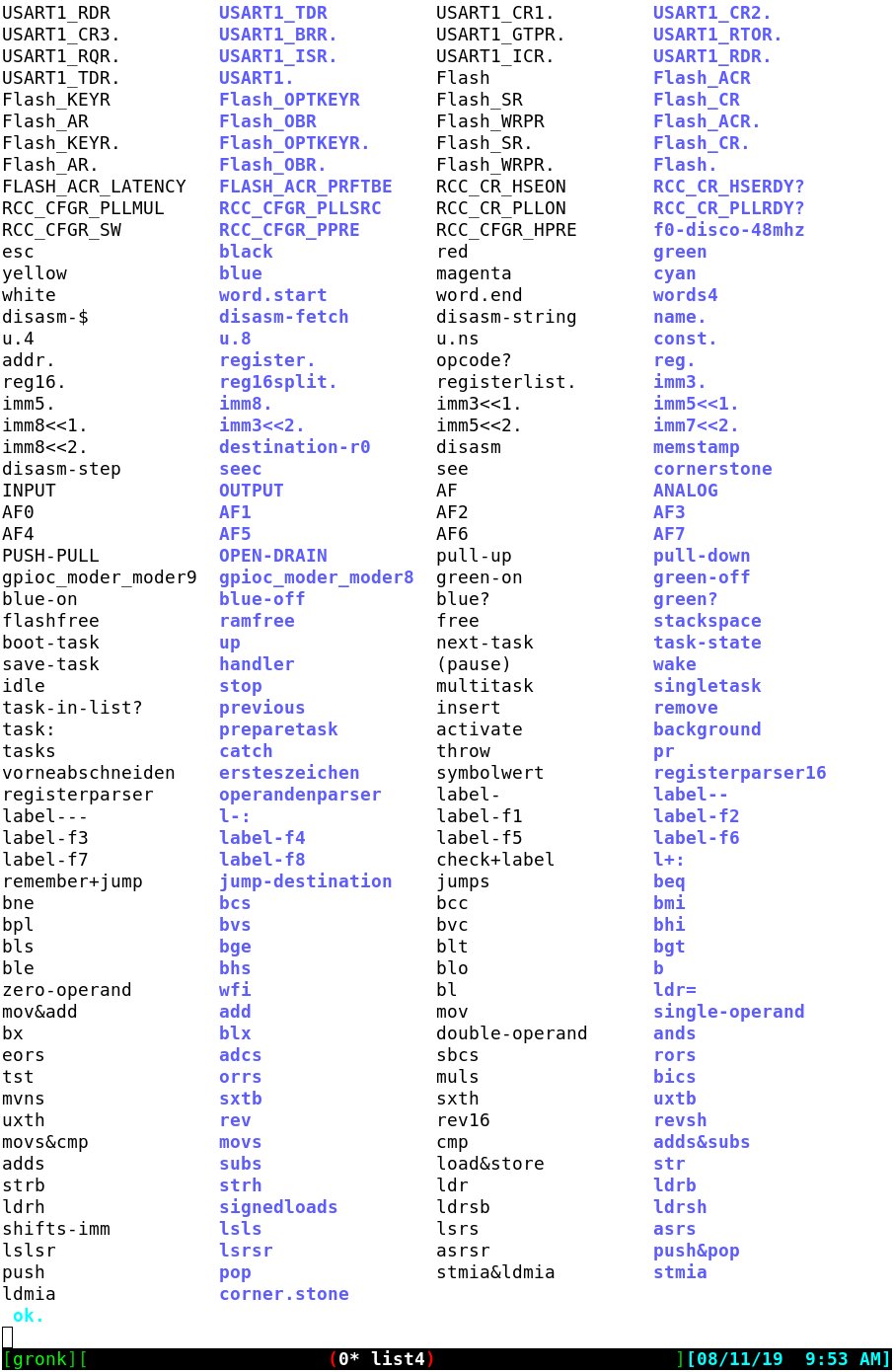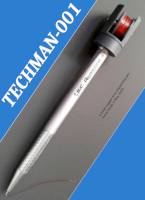Words4¶
words4 sample output.
Note
This is a non standard Wordlist using Words generated by SVD2FORTH.

Viewing The Mecrisp-Stellaris Dictionary¶
To view the Mecrisp-Stellaris Dictionary one can use the following Words. Each one has a different format:
Words¶
words sample output.
words
...
Address: 0000CDB8 Link: 0000CDDC Flags: 00000030 Code: 0000CDC2 Name: str
Address: 0000CDDC Link: 0000CE04 Flags: 00000030 Code: 0000CDE8 Name: strb
Address: 0000CE04 Link: 0000CE2C Flags: 00000030 Code: 0000CE10 Name: strh
Address: 0000CE2C Link: 0000CE50 Flags: 00000030 Code: 0000CE36 Name: ldr
Address: 0000CE50 Link: 0000CE78 Flags: 00000030 Code: 0000CE5C Name: ldrb
Address: 0000CE78 Link: 0000CEA0 Flags: 00000030 Code: 0000CE84 Name: ldrh
...
List¶
list sample output. “list” is part of the /common/dissasembler-m0.txt and /common/dissasembler-m3.txt files.
list
...
+ - 1- 1+ 2- 2+ cell+ negate not shr shl 2* cells 2/ abs u/mod /mod mod / even base binary decimal hex hook-emit
hook-key hook-emit? hook-key? hook-pause emit key emit? key? pause serial-emit serial-key serial-emit? serial-key?
cexpect accept tib >in current-source setsource source query compare cr bl space spaces [char] char ( \ ." c" s"
count ctype type hex. h.s u.s .s words unused registerliteral, call, literal, create does> <builds ['] ' postpone
inline, ret, exit recurse state ] [ : ; execute immediate inline compileonly 0-foldable 1-foldable 2-foldable
3-foldable 4-foldable 5-foldable 6-foldable 7-foldable constant 2constant smudge setflags aligned align h, , ><,
string, allot forgetram compiletoram? compiletoram compiletoflash (create) variable 2variable nvariable buffer:
dictionarystart dictionarynext skipstring find hook-find (find) cjump, jump, here flashvar-here then else if ahead
repeat while until again begin k j i leave unloop +loop loop do ?do case ?of of endof endcase token parse digit
number .digit hold hold< sign #> f#S f# #S # <# f. f.n ud. d. u. . evaluate interpret hook-quit quit eint? eint
dint ipsr nop unhandled reset irq-systick irq-fault irq-collection irq-exti0_1 irq-exti2_3 irq-exti4_15 irq-tsc
...
List Source¶
\ Copyright (C) 2013 Matthias Koch
\ This is free software under GNU General Public License v3.
: list ( -- )
cr
dictionarystart
begin
dup 6 + ctype space
dictionarynext
until
drop
;
Words4¶
words4 sample output.
words4
...
nop unhandled reset irq-systick
irq-fault irq-collection irq-exti0_1 irq-exti2_3
irq-exti4_15 irq-tsc irq-dma_ch1 irq-dma_ch2_3
irq-dma_ch4_5 irq-adc irq-tim1_up irq-tim1_cc
irq-tim2 irq-tim3 irq-tim6_dac irq-tim14
irq-tim15 irq-tim16 irq-tim17 irq-i2c1
irq-i2c2 irq-spi1 irq-spi2 irq-usart1
irq-usart2 irq-cec_can --- Flash Dictionary ---
b32loop. b16loop-a. b16loop. b8loop.
4bl. 4bh. 2b. 1b.
15b. b32sloop. bin. u.4
u.2 dump16 dump TEMPLATE
...
Words4 Creation¶
I wanted a neat, four column lister that printed like the listing above, with 20 character wide columns, but also handled Words greater than 20 characters. My “words4” source (based on word.fs above) is below.
Words4 Source¶
\ Program Name: words4.fs
\ This program may require preloaded support files
\ Date: Thu 25 Jul 2019 23:27:35 AEST
\ Copyright 2018 t.porter <terry@tjporter.com.au>, licensed under the GPL
\ For Mecrisp-Stellaris by Matthias Koch.
\ https://sourceforge.net/projects/mecrisp/
\ 140 bytes
: words4 ( -- ) cr \ A columnar Word list printer. Width = 20 characters, handles overlength Words neatly
0 \ column counter
dictionarystart
begin
dup 6 + dup
ctype \ dup before 6 is for dictionarynext input
count nip \ get number of characters in the word and drop the address of the word
20 swap - dup 0 > if \ if Word is less than 20 chars
spaces swap \ pad with spaces to equal 20 chars
else drop cr \ issue immediate carriage return and drop negative number
nip -1 \ and reset to column -1
then
dup 3 = if 3 - cr \ if at 4th column, zero column counter
else 1 +
then
swap
dictionarynext \ ( a-addr - - a-addr flag )
until
2drop
;
Key Words Used¶
dictionarystart ( - - a-addr ) Current entry point for dictionary search
dictionarynext ( a-addr - - a-addr flag ) Scans dictionary chain and returns true if end is reached.
ctype ( cstr-addr - - ) Prints a counted string.
count ( cstr-addr - - c-addr length ) Convert counted string into addr-length string
Words4 Operation¶
Words4 utilises the default “dictionarystart and dictionarynext” Words to iterate thru each Word name to the end of the dictionary. Each Word name is printed with “ctype” and the number of characters is determined using “count”.
As each column is 20 characters wide, any Word of less than 20 characters is ‘padded’ out with spaces so that it is exactly 20 characters in length.
A column counter emits a carriage return after four Word names have been printed.
Words greater than 20 characters end the column sequence after they are printed, and normal operation continues on the next line as illustrated by the “— Flash Dictionary —” Word above.
This code maintains 2 items on the data stack throughout its operation, they are the address of each Word and the column number, so to better understand how it works one should view the data stack after each line with “.s”. Reading at my initial ‘proof of concept’ code below (list4b) may assist the understanding of what is being done.
Coloured Columns¶
This version adds colour to the list.
Note
requires colour-term.fs

Words4c¶
Note
This is for a Terminal with a WHITE background, change “black” Words for another colour below if you use a BLACK background
: words4c ( -- ) cr \ A coloured columnar Word list printer. Width = 20 characters.
0 \ column counter
dictionarystart
begin
dup 6 + dup
3 pick \ copy the column counter value
case \ NOTE: colours here are for a WHITE terminal BACKGROUND !
0 of black endof
1 of blue endof
2 of black endof
3 of blue endof
endcase
ctype \ print word
white
count nip \ get number of characters in the word and drop the address of the word
20 swap - dup 0 > if \ if Word is less than 20 chars
spaces swap \ pad with spaces to equal 20 chars
else drop cr \ issue immediate carriage return and drop negative number
nip -1 \ and reset to column -1
then
dup 3 = if 3 - cr \ if at 4th column, zero column counter
else 1 +
then
swap
dictionarynext \ ( a-addr - - a-addr flag )
until
2drop
;
